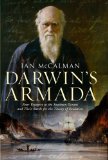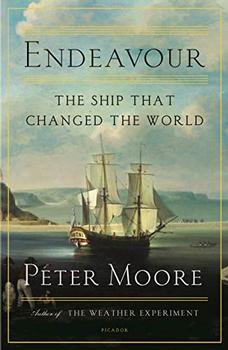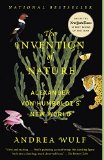Summary | Excerpt | Reviews | Beyond the book | Read-Alikes | Genres & Themes | Author Bio

Critics' Opinion:
Readers' Opinion:
First Published:
Aug 2009, 432 pages
Paperback:
Nov 2010, 432 pages
 Book Reviewed by:
Book Reviewed by:
Kim Kovacs
Buy This Book
The Miriam Webster dictionary defines an armada as "A fleet of
warships." In Iain McCalman's Darwin's Armada, the term refers to the
three scientists who were early supporters of Darwin's theory of evolution by
natural selection, and who paved the way for its acceptance by Great Britain's
scientific community: Joseph Hooker, botanist (1817-1911), Thomas Huxley,
biologist (1825-1895) and Alfred Wallace, zoologist (1823-1913). The book is, in
essence, the story of how the theory of evolution by natural selection came to
be (how evolution evolved, if you will), and the vital role played by these men
in its development.
The first half of Darwin's Armada provides brief biographical sketches of
Darwin, Hooker, Huxley and Wallace, and then concentrates on the voyages the men
took to other lands and the scientific skills they acquired during these
adventures. Darwin was a naturalist aboard the Beagle, Hooker served
aboard the Eramus, and Huxley on the Rattlesnake, while Wallace
spent nearly 20 years exploring the Amazon and Southeast Asia. McCalman's
emphasis in these chapters is on the various men's observations of the exotic
flora and fauna, as well as their interactions with the native inhabitants of
the areas they visited. McCalman does provide some description of the wooden
ships on which they traveled and the hardships they endured, but overall his
emphasis is on how their experiences shaped their scientific understanding.
These chapters are well written but do drag from time to time as the
author delves into the intricacies of the science involved.
On the voyage out, Huxley had discovered, by means of dissection and microscopic examination, an underlying set of structural and functional characteristics, undetected by previous naturalists. These characteristics linked several seemingly unrelated forms of Medusae (jellyfish) and the order of Siphonophora (colonies of stinging Medusae and polyps with siphon-shaped mouths), including the Portuguese man-of-war and the Vellela (by-the-wind sailor). Later research would add a further class of Anthozoa, including corals, to this new group.
The book's second half is set in England and focuses on the process involved
in the publication of Darwin's theories and the ensuing battles with other
scientists and theologians of the day, and at this point the narrative becomes
utterly fascinating. McCalman makes it clear that Darwin's theories would likely
have languished for decades without the active intervention of Hooker and
Huxley; indeed, Darwin did very little himself to promote his theories, largely
leaving the debate to others.
Interestingly, Wallace independently developed a very similar theory of
natural selection. Darwin, who'd been working on his own theory for nearly
twenty years, was spurred to finally publish out of fear that Wallace would beat
him to it. In a very complex – and shrewd - political move, Hooker arranged for
a brief on the theory of evolution through natural selection to be presented at
the Linnean Society (a British scientific society that promotes the study of all
aspects of the biological sciences) on 1 July, 1858, with authorship attributed
to both Darwin and Wallace (without Wallace's knowledge). Further encouraged by
Hooker and driven by competition from Wallace, Darwin set about expanding on his
work, and it is this manuscript that eventually became the groundbreaking
masterpiece, On the Origin of Species, published in late 1859. Its
release caused quite a stir, but it was meant to; Hooker and Huxley wanted to
wrest control of Britain's scientific societies from the Church of England,
which was responsible for all scientific appointments. The resulting debates
were as much about forcing a changing of the guard as they were
about Darwin's theories. McCalman chronicles this effort with a fast-paced
narrative that most readers will find entertaining and enlightening.
Darwin's Armada is a must-read for anyone interested in how the theory of
evolution developed. It is recommended particularly for those with an interest
in the biological sciences, although non-scientific readers will find it very
accessible.
![]() This review was originally published in The BookBrowse Review in September 2009, and has been updated for the
November 2010 edition.
Click here to go to this issue.
This review was originally published in The BookBrowse Review in September 2009, and has been updated for the
November 2010 edition.
Click here to go to this issue.

If you liked Darwin's Armada, try these:

by Peter Moore
Published 2020
An unprecedented history of the storied ship that Darwin said helped add a hemisphere to the civilized world.

by Andrea Wulf
Published 2016
The acclaimed author of Founding Gardeners reveals the forgotten life of Alexander von Humboldt, the visionary German naturalist whose ideas changed the way we see the natural world - and in the process created modern environmentalism.





The House on Biscayne Bay
by Chanel Cleeton
As death stalks a gothic mansion in Miami, the lives of two women intertwine as the past and present collide.

The Flower Sisters
by Michelle Collins Anderson
From the new Fannie Flagg of the Ozarks, a richly-woven story of family, forgiveness, and reinvention.

The Funeral Cryer by Wenyan Lu
Debut novelist Wenyan Lu brings us this witty yet profound story about one woman's midlife reawakening in contemporary rural China.
Your guide toexceptional books
BookBrowse seeks out and recommends the best in contemporary fiction and nonfiction—books that not only engage and entertain but also deepen our understanding of ourselves and the world around us.